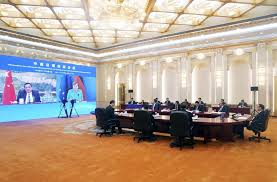China and Germany: friends in need, friends indeed

Beijing: Chinese Premier Li Keqiang and German Chancellor Angela Merkel held a video meeting on Thursday, where the two sides agreed to step up bilateral cooperation, notably in the fight against the coronavirus pandemic, and to continue promoting the relationship between China and the European Union.
The virtual meeting is the latest episode of the two countries’ persistent high-level exchanges in recent years, and a reflection of the deep political mutual trust between Beijing and Berlin. Chinese President Xi Jinping has so far paid two state visits to Germany, and Merkel, since assuming office as German chancellorship in 2005, has visited China 12 times.
Contacts between the leaders of the two sides have become even more frequent during the ongoing COVID-19 pandemic. Xi and Merkel have spoken three times since the outbreak. During the latest phone talk between Xi and Merkel last week, the two sides have agreed to keep in touch, uphold multilateralism, and safeguard global public health.
Those continuous high-level exchanges have played a major role in sustaining and strengthening their bilateral cooperation in various areas, particularly in trade and commerce.
Germany has long been China’s largest trading partner in Europe, and China has been Germany’s largest for the past three years, with trade standing at 184.88 billion U.S. dollars in 2019.
The two sides have also been working closely on the COVID-19 epidemic: Medical experts from the two countries have held video conferences on several occasions; Duisburg, sister city of Wuhan, was among the first to donate medical supplies to China; and during Thursday’s video conversation, Li said the two countries would continue to exchange experiences in combatting the virus and cooperation on vaccine and drug research and development.
China and Germany, the world’s second largest economy and the EU’s largest economy, share a broad consensus on a wide range of international issues, such as their steadfast commitments to free trade and multilateralism.
With such strong political foundation, the two countries should work more closely in supporting the World Health Organization to end the pandemic as soon as possible, shoring up confidence in the international community, and boosting global economic recovery in the post-pandemic world.
Such arduous work needs broad global cooperation, and the EU’s input is very much valuable. China has long cherished its relationship with the EU, and repeatedly claimed that a strong, united and open EU is in China’s interests.
Germany, which is soon to take over EU’s rotating presidency for the second half of this year, can play an important role in promoting Beijing’s cooperation with Brussels.
As the world is becoming more turbulent, China and Germany shoulder important responsibilities and their cooperation extends beyond bilateral ties, Xi told Merkel during their phone talk in January.
China-Germany and China-EU strategic cooperation not only benefits the people of China and Europe but adds a dose of certainty to the world. Enditem





